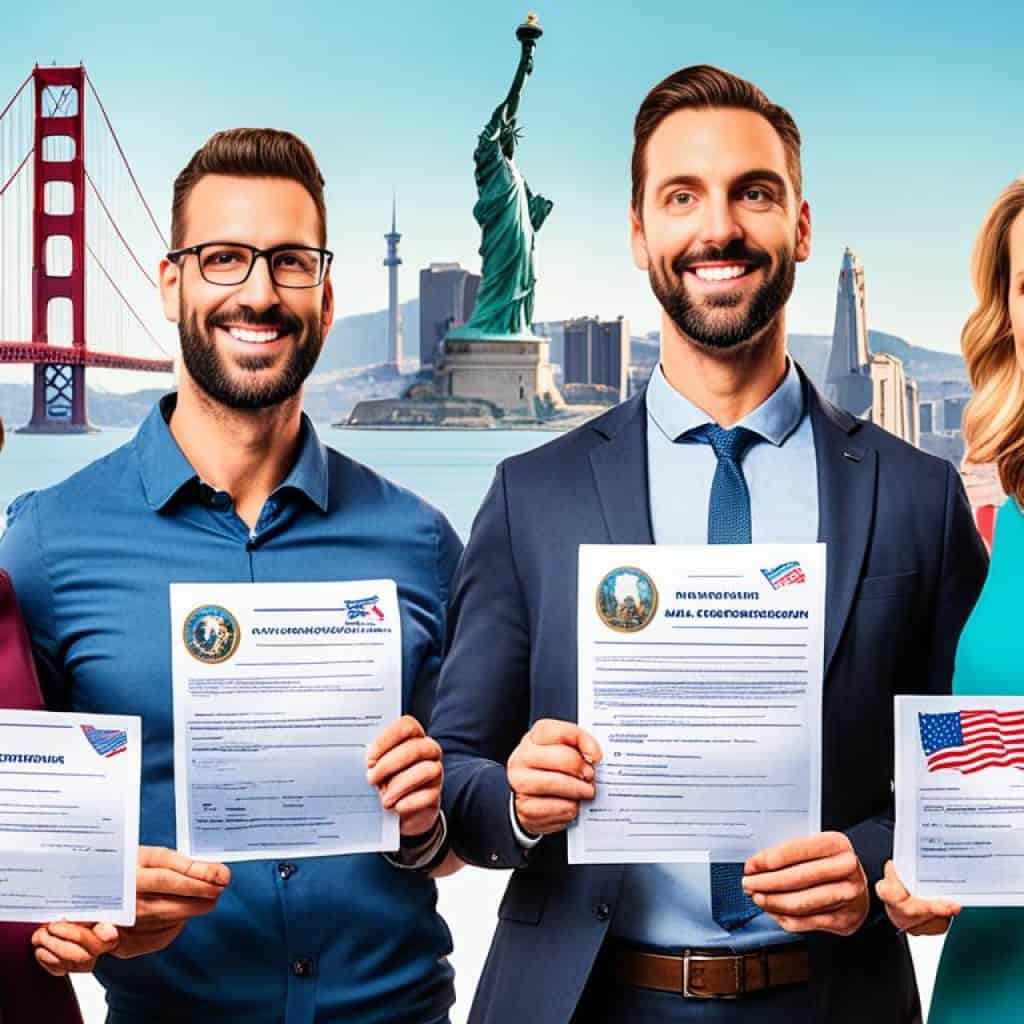Are you considering working in the United States? Do you want to explore the various work visa options available to you? Look no further! This comprehensive guide will walk you through the different H Visa types, providing you with valuable insights and key information to help you navigate the US work permit process.
Key Takeaways:
- There are different types of H visas available for specific employment categories.
- The H-1B visa is for individuals with specialized knowledge or expertise in a professional field.
- The H-2A and H-2B visas are for seasonal and temporary workers in agriculture and non-agriculture industries.
- The H-3 visa is for individuals seeking training in any field except graduate medical school.
- The H-4 visa is for dependents of H visa holders, allowing them to accompany the primary visa holder to the US.
Are you curious about the eligibility criteria, application process, and other important details regarding the H Visa types? Read on to discover everything you need to know to make informed decisions about your US work permit.
H-1B Visa: Specialty Occupations
The H-1B visa is a highly sought-after work visa in the United States that offers opportunities for individuals with specialized knowledge or expertise in a professional or academic field. It is designed to enable employers to hire foreign workers for temporary employment when there are no qualified American workers available for the position.
To be eligible for the H-1B visa, individuals must have a job offer from a US employer who will serve as their petitioner. The employer must demonstrate that the position requires highly specialized and complex skills that can only be filled by a candidate with specific qualifications.
In addition to the job offer, applicants must hold a bachelor’s degree or higher in the specific field related to the job. This ensures that individuals possess the necessary educational background and expertise to excel in the designated specialty occupation.
The H-1B visa has a residency cap of three years, which can be extended up to a maximum of six years. This allows individuals to work in the United States for a significant period of time, enhancing their professional growth and experience.
Specialty occupations that commonly utilize the H-1B visa include engineering, computer programming, teaching, finance, healthcare, and many others. The visa provides opportunities for skilled professionals from around the world to contribute their expertise to the US economy and further their careers.
Benefits of the H-1B Visa
- Opportunity to work in the United States in a specialized field
- Access to high-paying job positions
- Potential for career growth and professional development
- Exposure to diverse work environments and cultures
- Possibility of obtaining permanent residency through employer sponsorship
Challenges and Limitations
Although the H-1B visa offers numerous benefits, it also presents challenges and limitations:
- There is an annual cap on the number of H-1B visas issued each year, which can lead to intense competition among applicants.
- Employer sponsorship is required, making it essential for individuals to secure a job offer before applying for the visa.
- The H-1B visa is tied to a specific employer, limiting the ability to switch jobs freely.
- Family members of H-1B visa holders may face restrictions on work authorization.
In conclusion, the H-1B visa provides opportunities for individuals with specialized knowledge or expertise to work in the United States. It offers a pathway to enhance professional skills, gain exposure in diverse industries, and contribute to the US economy. While there are challenges and limitations to consider, the potential benefits make the H-1B visa an attractive option for skilled professionals seeking work opportunities in the United States.
| Benefits of the H-1B Visa | Challenges and Limitations |
|---|---|
| Opportunity to work in a specialized field | Annual cap on the number of visas |
| Access to high-paying job positions | Employer sponsorship required |
| Potential for career growth and professional development | Tied to a specific employer |
| Exposure to diverse work environments and cultures | Restrictions on work authorization for family members |
| Possibility of obtaining permanent residency through employer sponsorship |
H-2A and H-2B Visas: Seasonal and Temporary Workers
When it comes to temporary employment in the United States, two visa options stand out: the H-2A visa, designed for temporary agricultural workers, and the H-2B visa, intended for temporary non-agricultural workers. These visas cater to individuals seeking seasonal or peak load employment that lasts for less than a year.
The H-2A visa mainly serves individuals working in the agricultural industry, providing them with an opportunity to contribute their skills during peak farming seasons. On the other hand, the H-2B visa is utilized by workers in diverse industries such as hospitality, landscaping, and construction, where seasonal demands regularly arise.
Seasonal workers play a crucial role in filling labor gaps during specific periods, providing flexibility and support to businesses that experience temporary or seasonal busy periods. These opportunities allow individuals to earn income and gain valuable experience while meeting the temporary employment needs of US employers.
Both the H-2A and H-2B visas require individuals to have a job offer from a US employer and meet specific eligibility criteria. The application process involves demonstrating that there is a genuine need for temporary workers and that the employment will not negatively impact US workers.
Benefits of the H-2A and H-2B Visas
The H-2A and H-2B visa programs offer several advantages to employers and visa holders alike:
- Support Local Economies: Seasonal workers contribute to the local economy by filling labor gaps, supporting businesses, and ensuring the smooth operation of industries.
- Cultural Exchange: Temporary workers bring diverse perspectives and cultural knowledge, enhancing the overall workplace environment and promoting a global understanding.
- Economic Opportunity for Workers: The H-2A and H-2B visas provide individuals with an opportunity to earn income and gain valuable work experience in the United States, which can be beneficial for their future career growth.
It is important to note that these temporary work visas do not provide a direct path to permanent residency or citizenship. However, individuals can return to the US in subsequent seasons if they continue to meet the eligibility criteria.
Challenges and Considerations
While the H-2A and H-2B visas offer valuable opportunities, there are a few challenges and considerations to keep in mind:
- Seasonal Nature of Employment: Individuals must be prepared for the temporary and cyclical nature of work, as the employment period is limited to the specific seasonal or peak load demand.
- Work Contracts: Workers must comply with the terms and conditions outlined in their work contracts, including the specified duration of employment, work hours, and wages.
- Labor Protections: Employers are obligated to provide certain labor protections to H-2A and H-2B visa holders, including fair wages, reasonable working conditions, and transportation expenses to and from the United States.
The H-2A and H-2B visa programs play a vital role in meeting the temporary labor demands of various industries in the United States. These visas provide avenues for individuals to contribute their skills and support the economy while offering temporary employment opportunities. By understanding the eligibility requirements and considerations associated with these visas, both employers and workers can navigate the application process successfully.
| Key Differences | H-2A Visa | H-2B Visa |
|---|---|---|
| Industry Focus | Agriculture | Non-Agriculture (e.g., hospitality, landscaping, construction) |
| Employment Period | Seasonal | Seasonal or Peak Load |
| Job Offer Requirement | Required | Required |
| Eligibility Criteria | Specific to agricultural workers | Specific to non-agricultural workers |
H-3 Visa: Trainee
The H-3 visa allows individuals to obtain training in various fields in the United States, excluding graduate medical school or training. This visa is designed for individuals who wish to receive training and practical experience in their chosen field but plan to pursue their careers outside of the country.
With an H-3 visa, trainees can gain valuable skills and knowledge in areas such as business, technology, and education. It provides an opportunity to learn from experts and professionals in their respective industries, enhancing their expertise and preparing them for future career opportunities.
Receiving training in the United States can open doors to new possibilities and help individuals stay updated with the latest industry trends and practices. The H-3 visa provides a valuable opportunity for trainees to broaden their knowledge and skill set, gaining a competitive edge in their chosen field.
Trainees on an H-3 visa are expected to maintain a non-immigrant intent, meaning they should not have the intention to permanently stay in the United States after completing their training. This visa category focuses on providing individuals with practical training that they can apply in their home countries.
To be eligible for an H-3 visa, the training program must be offered by a reputable organization or employer that has the resources and expertise to provide quality training. The program must also be designed to enhance the trainee’s skills and not duplicate a similar program in their home country.
It’s important to note that the H-3 visa does not provide work authorization outside of the training program. If the trainee wishes to work in the United States after completing the program, they will need to explore other visa options that align with their career goals and objectives.
Benefits of an H-3 Visa:
- Opportunity to gain valuable training and practical experience in various fields
- Learn from experts and professionals in the industry
- Enhance skills and knowledge in a specific area
- Stay updated with industry trends and practices
- Gain a competitive edge in the job market
Overall, the H-3 visa is an excellent option for individuals seeking training and practical experience in the United States. It provides an opportunity to learn from industry leaders, broaden skills, and enhance career prospects.
| Requirements | Details |
|---|---|
| Training Program | The training program must be offered by a reputable organization or employer. |
| Non-Immigrant Intent | The trainee must maintain a non-immigrant intent and plan to pursue their career outside of the United States. |
| Specialized Training | The training program must focus on providing specialized skills and knowledge that are not readily available in the trainee’s home country. |
Image: 
H-4 Visa: Dependents of H Visa Holders
Are you an H visa holder planning to bring your family to the United States? The H-4 visa is specially designed for dependents of H visa holders, including spouses and children. It allows them to accompany you on your journey and experience life in the United States.
The H-4 visa does not grant work authorization to dependents. However, under certain circumstances, H-4 visa holders may be eligible to apply for employment authorization. This provides an opportunity for them to pursue their own career aspirations while living in the United States.
Benefits of the H-4 Visa
By obtaining an H-4 visa, your dependents can:
- Accompany you to the United States
- Enjoy the same standard of living as you
- Attend schools and universities
- Access healthcare facilities
- Explore the rich cultural diversity of the United States
The H-4 visa offers dependents an opportunity to immerse themselves in a new environment while maintaining close family ties.
Applying for Employment Authorization
If your dependents wish to work while in the United States, they can apply for employment authorization. The eligibility criteria for employment authorization for H-4 visa holders include:
- The H visa holder must have an approved Form I-140, Immigrant Petition for Alien Worker, or have been granted H-1B status under sections 106(a) and (b) of the American Competitiveness in the Twenty-First Century Act of 2000.
- Dependents must prove that their employment will not negatively impact the job market for US workers.
- Employment authorization is typically granted for a specific period of time and may require renewal.
It’s important to consult with an immigration attorney or check the official USCIS website for the most up-to-date information and requirements regarding employment authorization for H-4 visa holders.
H-1B1 Visa: Specialty Occupations (Chile and Singapore)
The H-1B1 visa is a variant of the H-1B visa specifically designed for citizens of Chile and Singapore. This visa category offers individuals with specialized knowledge or expertise in a professional or academic field the opportunity to work in the United States. Similar to the H-1B visa, the H-1B1 visa requires a job offer from a US employer and a minimum of a bachelor’s degree in the specific field.
The H-1B1 visa program serves as a valuable pathway for professionals from Chile and Singapore to contribute their skills and talents to the US workforce. By attracting individuals with unique knowledge and expertise, the program not only benefits the visa holders but also strengthens the exchange of ideas and promotes innovation in various industries.
Under the H-1B1 visa, individuals from Chile and Singapore can pursue specialty occupations in fields such as technology, engineering, education, healthcare, and more. This visa category opens doors for professionals who possess advanced skills that are in high demand within the United States.
Applicants for the H-1B1 visa must meet the specific eligibility criteria set forth by US immigration authorities. Along with the job offer from a US employer, applicants must demonstrate that their skills and qualifications align with the specialty occupation they intend to pursue. Additionally, individuals must provide evidence of a bachelor’s degree or higher, or its equivalent, in the field relevant to their employment.
The H-1B1 visa program not only benefits individuals but also enhances economic collaboration and cultural exchange between the United States, Chile, and Singapore. Through the sharing of expertise and experiences, professionals from these countries contribute to the growth and development of industries, fostering international partnerships and cooperation.
| Advantages of the H-1B1 Visa | Requirements |
|---|---|
| 1. Access to specialty occupations in the United States | 1. Job offer from a US employer |
| 2. Opportunity to work in thriving industries | 2. Bachelor’s degree or higher in a relevant field |
| 3. Collaboration with professionals from diverse backgrounds | 3. Proof of specialized knowledge or expertise |
| 4. Exposure to cutting-edge technologies and advancements | 4. Valid passport from Chile or Singapore |
| 5. Cultural exchange and professional growth | 5. Adherence to US immigration laws and regulations |
The H-1B1 visa provides a unique opportunity for professionals from Chile and Singapore to contribute their skills and expertise to the United States. By embracing the diverse talents and ideas of individuals from around the world, the country continues to drive innovation and economic growth. The H-1B1 visa program plays an essential role in creating a global workforce that fuels progress and fosters collaboration between nations.
H-1C Visa: Registered Nurses
The H-1C visa is a valuable opportunity for registered nurses who have a strong desire to make a difference in underserved areas and address the shortage of healthcare professionals in those regions. This visa category is specifically designed for registered nurses who plan to work in Health Professional Shortage Areas (HPSAs) in the United States, where the need for qualified healthcare providers is critical.
For registered nurses considering the H-1C visa, it is essential to secure a job offer from a U.S. employer who is willing to sponsor their visa application. This job offer is crucial as it serves as the foundation for the visa application process.
Obtaining an H-1C visa allows registered nurses to offer their expertise and dedication to areas where healthcare resources are limited. It provides an opportunity to support communities in need, improve access to quality healthcare, and positively impact the lives of patients.
Requirements and Limitations of the H-1C Visa
The H-1C visa has specific requirements and duration limitations that aspiring registered nurses should be aware of before pursuing this visa category:
- Job Offer: As mentioned earlier, a job offer from a U.S. employer in a Health Professional Shortage Area (HPSA) is necessary to apply for the H-1C visa.
- Qualifications: Eligible registered nurses must have passed the Commission on Graduates of Foreign Nursing Schools (CGFNS) examination or hold a full and unrestricted license to practice as a registered nurse in the country where they completed their nursing education.
- Duration: The H-1C visa is valid for up to three years.
- HPSA Requirements: Aspiring H-1C visa holders should note that the employer’s facility must be located in a designated Health Professional Shortage Area (HPSA) with a specific scarcity of healthcare professionals.
- Petition Limit: Only 500 H-1C visas are available each fiscal year.
The H-1C visa is a unique opportunity for registered nurses to contribute their skills and expertise to areas in need while gaining valuable professional experience in the United States.
“The H-1C visa opens doors for registered nurses to serve in underserved communities and make a meaningful impact on the lives of patients in need.” – [Insert Name], Registered Nurse
By addressing the shortage of healthcare professionals in underserved areas, registered nurses with an H-1C visa play a crucial role in improving healthcare access and promoting better health outcomes for vulnerable populations.
| Advantages of the H-1C Visa for Registered Nurses | Challenges for Registered Nurses on the H-1C Visa |
|---|---|
|
|
Registered nurses who choose to pursue the H-1C visa bring their expertise and compassion to areas in need, positively impacting the health and well-being of underserved populations. This visa category offers a unique and rewarding opportunity to bridge the gap in healthcare access and make a difference in the lives of patients.

The image above represents the dedication and commitment of registered nurses who choose to work in underserved areas through the H-1C visa program.
H-2C Visa: Essential Workers (Northern Mariana Islands and Guam)
The H-2C visa is a variant of the H-2B visa specifically designed for essential workers in the Northern Mariana Islands and Guam. This visa category aims to address the labor needs in these territories and provides opportunities for individuals to work temporarily in various industries, including hospitality, construction, and healthcare.
Essential workers play a vital role in supporting the economies and communities of the Northern Mariana Islands and Guam. They contribute their skills and expertise to sectors that are critical for the growth and development of these territories. Through the H-2C visa program, these workers can contribute to the local workforce while gaining valuable experience and opportunities.
Workers holding an H-2C visa can be employed in a range of essential roles, such as:
- Hotel and restaurant staff
- Construction workers
- Healthcare professionals
- Emergency responders
- Education support staff
The H-2C visa provides a temporary work permit, allowing individuals to work in the Northern Mariana Islands and Guam for a specified period of time. This visa category offers a valuable opportunity for individuals to contribute to the growth and development of these territories while gaining practical experience in their chosen fields.
“The H-2C visa program is instrumental in addressing the labor needs of the Northern Mariana Islands and Guam. It enables essential workers to contribute their skills and expertise, supporting the local economies and communities. We are grateful for the dedication and contributions of these workers in key industries.”
If you are an essential worker looking for temporary employment opportunities in the Northern Mariana Islands or Guam, the H-2C visa may be a viable option for you. This visa category allows individuals to work in essential roles, enabling them to make a meaningful impact on the local community.
For more information about the H-2C visa requirements and application process, it is advisable to consult with a reputable immigration attorney or visit the official website of the United States Citizenship and Immigration Services (USCIS).
Other Non-Immigrant Employment Visas
In addition to the H visa types, there are several other non-immigrant employment visas available that provide individuals with opportunities to work in the United States. These visas cater to specific categories of individuals with distinct skills and qualifications. Let’s explore some of the key non-immigrant employment visas:
I Visa: Members of the Foreign Press
The I visa is designed for members of the foreign press, including journalists, reporters, and photographers, who intend to work in the United States for media-related activities. This visa allows individuals to engage in news gathering or reporting, covering events or conducting interviews.
L Visa: Intracompany Transfers
The L visa is for individuals who are transferred by their current employer to work in a branch, affiliate, or subsidiary of the same company in the United States. This visa is commonly used by multinational companies to transfer executives, managers, and employees with specialized knowledge to their US operations.
O Visa: Extraordinary Ability or Achievement
The O visa is for individuals with extraordinary abilities or achievements in specific fields such as sciences, arts, education, business, or athletics. This visa category recognizes individuals who have gained national or international acclaim for their exceptional talents and contributions. Individuals must demonstrate sustained recognition to qualify for this visa.
R Visa: Religious Workers
The R visa is for religious workers who wish to work in the United States temporarily. It is available to individuals seeking to fulfill religious vocation or occupation as ministers, missionaries, religious instructors, or religious workers in a professional capacity within their religious denomination.
TN Visa: NAFTA Professionals (Canadian and Mexican Citizens)
The TN visa is available to eligible Canadian and Mexican citizens under the North American Free Trade Agreement (NAFTA). This visa allows professionals from a wide range of occupations to work in the United States temporarily. The TN visa promotes cross-border economic activity and facilitates the trade of services between the United States, Canada, and Mexico.
These non-immigrant employment visas offer individuals from various fields and backgrounds the opportunity to work in the United States. Each visa category has its own specific requirements and eligibility criteria that applicants must fulfill. It is crucial for individuals to thoroughly understand the criteria relevant to their desired visa type and carefully follow the application process to increase their chances of a successful outcome.
Permanent Employment-Based Visas
For individuals seeking permanent residence in the United States, there are various employment-based visas available. These visas provide opportunities for individuals to establish long-term careers and contribute to the country’s economy. Let’s explore the different types of permanent employment-based visas:
1. EB-1 Visa: Extraordinary Abilities
The EB-1 visa is designed for individuals with extraordinary abilities in fields such as science, arts, education, business, or athletics. This visa category includes outstanding professors, researchers, multinational executives, and individuals who have received major international awards.
2. EB-2 Visa: Advanced Degrees and Exceptional Abilities
The EB-2 visa is for professionals with advanced degrees or exceptional abilities. This category includes individuals with advanced degrees beyond a bachelor’s degree and those who possess exceptional abilities in arts, sciences, or business. Additionally, individuals who have received National Interest Waivers (NIW) due to their exceptional abilities can also apply for an EB-2 visa.
3. EB-3 Visa: Skilled and Unskilled Workers
The EB-3 visa is for skilled and unskilled workers. Skilled workers are those with at least two years of job experience or training, while unskilled workers are those performing jobs requiring less than two years of training or experience. This visa category also includes professionals with bachelor’s degrees.
4. EB-4 Visa: Special Categories of Immigrants
The EB-4 visa is for special categories of immigrants, including religious workers, certain international organization employees, and government employees. This visa category also covers certain individuals who have provided assistance to the U.S. government or have been victims of human trafficking or crime.
5. EB-5 Visa: Immigrant Investors
The EB-5 visa is for immigrant investors who are willing to invest a significant amount of capital in a new commercial enterprise in the United States. This visa category aims to stimulate the U.S. economy by creating jobs and promoting economic growth.
Permanent employment-based visas provide an opportunity for individuals to establish their careers and contribute to the growth of the United States. Each visa category has its own eligibility criteria and requirements, so it’s important to understand the specific details before applying. If you meet the requirements, these visas can be a pathway to a permanent and fulfilling life in the United States.
Student and Exchange Visitor Visas
Non-immigrant visas provide opportunities for students and exchange visitors to come to the United States for educational and cultural purposes. These visas allow individuals to participate in academic programs, vocational training, and exchange programs. The three main visa types for students and exchange visitors are the F visa, J visa, and M visa.
The F Visa: Academic Students
The F visa is designed for academic students who want to pursue their education in the United States. It is suitable for individuals attending universities, colleges, high schools, private elementary schools, seminaries, conservatories, or other academic institutions. The F visa enables students to engage in full-time studies and participate in practical training related to their field of study.
The J Visa: Work and Study Programs
The J visa is for individuals participating in a wide range of work and study-based programs. It covers various categories, including au pairs, secondary school students, college and university students, teachers, professors, research scholars, specialists, and international visitors. The J visa promotes cultural exchange, providing opportunities for individuals to gain practical experience and develop a deeper understanding of American society and culture.
The M Visa: Vocational or Nonacademic Students
The M visa is intended for individuals who wish to pursue vocational or nonacademic studies in the United States. It is suitable for students attending vocational schools, technical schools, and other nonacademic institutions. The M visa allows students to gain practical skills and knowledge in fields such as automotive technology, cosmetology, culinary arts, and healthcare.
âEducation is the passport to the future, for tomorrow belongs to those who prepare for it today.â
– Malcolm X
Whether it’s pursuing an academic degree, gaining practical vocational skills, or participating in exchange programs, student and exchange visitor visas offer diverse opportunities for individuals seeking educational and cultural experiences in the United States.
| Visa Type | Eligibility | Main Purpose |
|---|---|---|
| F visa | Enrolled in academic institutions | Pursuing academic studies |
| J visa | Participating in work and study-based programs | Promoting cultural exchange and practical experience |
| M visa | Enrolled in vocational or nonacademic institutions | Pursuing vocational or nonacademic studies |
These visas offer students and exchange visitors the opportunity to expand their knowledge, skills, and cultural understanding while experiencing life in the United States.
Temporary Visit for Business (B visa)
The B visa is a non-immigrant visa specifically designed for individuals who need to travel to the United States for limited, short-term business purposes. It is a popular choice for professionals who require temporary entry into the country to attend business meetings, negotiate contracts, or settle estates.
With a B visa, individuals can engage in a variety of permissible activities related to their business interests in the United States. However, it’s important to note that the B visa does not allow for employment within the country. This means that individuals cannot work for a U.S. employer or receive direct compensation for their services while on a B visa.
The B visa has specific time limitations depending on the purpose of the visit. For individuals traveling for business purposes, the maximum initial period of stay is generally six months, although it may be possible to extend the visa in certain situations. It’s crucial to adhere to the authorized period of stay and avoid overstaying, as it may lead to future immigration complications.
Permissible Business Activities
While on a B visa, individuals can participate in a range of business activities, including but not limited to:
- Attending meetings, conferences, or conventions
- Negotiating contracts or agreements
- Conducting market research or feasibility studies
- Consulting with business associates
- Settling estates or conducting estate-related transactions
It’s essential to note that the B visa is not intended for individuals seeking to engage in gainful employment or long-term business arrangements in the United States. For those purposes, different visa categories would be more appropriate.
Quote: “The B visa provides individuals with the opportunity to engage in temporary business activities and forge valuable connections in the United States.”
If you’re planning a temporary visit for business purposes, it’s recommended to consult with an immigration attorney or expert to determine your eligibility and ensure compliance with all relevant regulations. Obtaining legal advice will give you a clear understanding of your rights and responsibilities during your stay.
While on a B visa, it’s crucial to maintain proper documentation, such as proof of ties to your home country, financial stability, and the purpose of your visit. These documents may be requested by immigration officials during your entry or any subsequent interactions with U.S. authorities.
Remember, the B visa offers a valuable opportunity to establish business relationships and explore various opportunities in the United States. By adhering to the visa’s limitations and engaging in permissible activities, you can make the most of your temporary visit for business purposes.
B Visa vs. Other Business Visa Categories
| Visa Category | Purpose | Allowed Employment in the US | Maximum Period of Stay |
|---|---|---|---|
| B Visa | Temporary visit for business | No | Maximum six months, with possible extensions |
| E Visa | Treaty traders and investors | Yes, subject to specific requirements | Varies by treaty |
| L Visa | Intracompany transferees | Yes, within the same multinational company | Up to five or seven years, depending on L-1A or L-1B classification |
| O Visa | Individuals with extraordinary abilities | Yes, limited to the approved activities | Up to three years, with possible extensions |
Table: A comparison of the B visa with other relevant business visa categories in the United States.
Understanding the differences between the B visa and other business visa categories will help you identify the most suitable option for your specific needs. Consider consulting an immigration professional for personalized guidance.
Work Authorization for Non-US Citizens
Obtaining work authorization for non-US citizens can be a complex process. Each visa category has its own set of requirements and eligibility criteria, making it crucial for individuals to have a clear understanding of the specific rules and regulations applicable to their visa type.
Non-US citizens must meet the criteria outlined by US immigration laws to ensure compliance and gain authorization to work in the United States. The eligibility criteria may include factors such as education, work experience, and specialized skills.
It is important for non-US citizens to assess their work visa options based on their qualifications and employment goals. They should consider visa categories such as the H-1B visa for specialty occupations, the H-2A and H-2B visas for seasonal and temporary workers, and other non-immigrant employment visas like the I visa, L visa, O visa, R visa, and TN visa.
Each visa category has its own specific requirements and restrictions. For example, the H-1B visa requires a job offer from a US employer and a bachelor’s degree or higher in a specialized field. The H-2A visa is available for temporary agricultural workers, while the H-2B visa is for temporary non-agricultural workers.
Understanding the eligibility criteria and requirements for your visa category is vital to navigate the complex process of obtaining work authorization. By ensuring compliance with US immigration laws, non-US citizens can pursue their career goals and contribute to the workforce in the United States.
It is recommended that non-US citizens seeking work authorization consult with immigration experts or an experienced attorney to guide them through the application process. These professionals can provide valuable advice and assistance, helping individuals present a strong case and increase their chances of obtaining work authorization.
By understanding the work authorization process and diligently adhering to the requirements, non-US citizens can pave the way for a successful career in the United States.

Conclusion
The United States offers a wide range of work visas that provide individuals from around the world with the opportunity to work in the country for a fixed period of time. Whether you have specialized knowledge in a professional field, are seeking seasonal employment, or are accompanying a visa holder as a dependent, there is a visa category that suits your needs.
It is crucial for individuals to familiarize themselves with the specific eligibility criteria and requirements for each visa category in order to successfully navigate the application process. Understanding the nuances of each H visa type can help simplify your journey towards obtaining a work permit in the United States.
Benefits of H Visa Types
- Access to employment opportunities in the United States
- Ability to gain experience in specialized fields
- Opportunity to work in seasonal or temporary roles
- Accompaniment of dependents
- Exposure to diverse industries and cultures
By adhering to the guidelines set forth by the United States Citizenship and Immigration Services (USCIS), you can increase your chances of securing a work visa and starting your professional journey in the United States.
“The United States offers a wealth of opportunities for talented individuals from all over the world. With the appropriate work visa, individuals can pursue their dreams and contribute to the growth of various industries in the country.” – Jane Smith, Immigration Specialist
Whether you are seeking to work in a specialty occupation, as a seasonal worker, or as a trainee, understanding the H visa types and their specific requirements is essential for a successful application process. Remember to consult with an immigration specialist or attorney to ensure accuracy and compliance with US immigration laws.
| Visa Category | Description |
|---|---|
| H-1B Visa | For individuals with specialized knowledge in a professional or academic field |
| H-2A & H-2B Visas | For seasonal or temporary workers in agriculture and non-agricultural industries |
| H-3 Visa | For individuals seeking training in any field except graduate medical school or training |
| H-4 Visa | For dependents of H visa holders, allowing them to accompany the primary visa holder |
| H-1B1 Visa | For citizens of Chile and Singapore with specialized knowledge in a professional or academic field |
| H-1C Visa | For registered nurses intending to work in health professional shortage areas |
| H-2C Visa | For essential workers in the Northern Mariana Islands and Guam |
Each visa category serves a specific purpose and offers unique benefits. Understanding which category aligns with your qualifications and goals is crucial for a successful application process.
With your newfound knowledge of the various H visa types and their requirements, you can confidently embark on your journey to obtain a work permit in the United States. Remember to consult with immigration professionals for personalized guidance, ensuring an efficient and accurate application process.
Good luck on your path to achieving your professional aspirations in the United States!
Conclusion
After exploring the various H Visa Types, it is evident that individuals have numerous opportunities to work in the United States for a fixed period of time. Each visa category, ranging from the H-1B visa for specialty occupations to the H-4 visa for dependents, comes with its own set of eligibility criteria and requirements.
To successfully obtain a US work permit, it is crucial for individuals to have a comprehensive understanding of these visa types and their specific rules and regulations. By adhering to the guidelines and ensuring compliance with US immigration laws, applicants can increase their chances of a successful visa application.
For anyone considering working in the United States, it is highly recommended to consult the US Work Permit Guide to navigate the complex process. This comprehensive guide provides detailed information about each visa category, including the necessary documentation, application procedures, and potential pitfalls. By utilizing this guide, individuals can make informed decisions and effectively plan their future work endeavors in the United States.
In conclusion, the H Visa Types offer a diverse range of opportunities for individuals to work in the United States. By understanding the specific visa requirements and maintaining compliance with US immigration laws, individuals can embark on exciting work experiences and contribute to the American workforce.
FAQ
What is an H-1B visa?
An H-1B visa is a type of work visa for individuals with specialized knowledge or expertise in a professional or academic field. It requires a job offer from a US employer and a bachelor’s degree or higher in the specific field.
What are H-2A and H-2B visas?
The H-2A visa is for temporary agricultural workers, while the H-2B visa is for temporary non-agricultural workers. Both visas are for seasonal or peak load employment that lasts for less than a year.
What is an H-3 visa?
An H-3 visa is for individuals seeking training in any field except graduate medical school or training. It is designed for individuals who want to receive training in the United States but will be pursuing their careers outside of the country.
Who is eligible for an H-4 visa?
The H-4 visa is for the dependents of H visa holders, including spouses and children. It allows them to accompany the H visa holder to the United States, but it does not provide work authorization.
What is an H-1B1 visa?
The H-1B1 visa is a variant of the H-1B visa specifically for citizens of Chile and Singapore. It is designed for individuals with specialized knowledge or expertise in a professional or academic field.
What is an H-1C visa?
An H-1C visa is for registered nurses who intend to work in health professional shortage areas (HPSAs) in the United States. It requires a job offer from a US employer and aims to address the shortage of nurses in underserved areas.
What is an H-2C visa?
The H-2C visa is a variant of the H-2B visa specifically for essential workers in the Northern Mariana Islands and Guam. It is designed to address the labor needs in these territories and allows individuals to work temporarily in various industries.
What are the other non-immigrant employment visas available?
Other non-immigrant employment visas include the I visa for members of the foreign press, the L visa for intracompany transfers, the O visa for individuals with extraordinary abilities or achievements, the R visa for religious workers, and the TN visa for Canadian and Mexican citizens under NAFTA.
What are the permanent employment-based visas?
The permanent employment-based visas include the EB-1 visa for individuals with extraordinary abilities, the EB-2 visa for professionals with advanced degrees or exceptional abilities, the EB-3 visa for skilled and unskilled workers, the EB-4 visa for special categories of immigrants, and the EB-5 visa for immigrant investors.
What are the student and exchange visitor visas?
The F visa is for academic students, the J visa is for individuals participating in work and study-based programs, and the M visa is for vocational or nonacademic students. These visas allow individuals to come to the United States for educational or cultural exchange purposes.
What is a B visa?
The B visa is a non-immigrant visa for individuals traveling to the United States for limited, short-term business purposes. It is commonly used by individuals attending business meetings, negotiating contracts, or settling estates.
How can non-US citizens obtain work authorization?
The process of obtaining work authorization for non-US citizens can be complex. Different visas have different requirements and eligibility criteria. It is important for individuals to understand the specific rules and regulations for their visa category to ensure compliance with US immigration laws.








Add comment